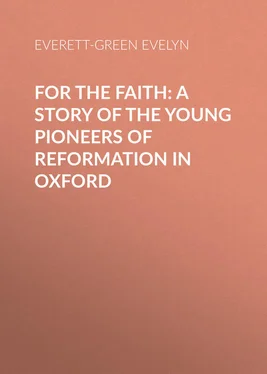Evelyn Everett-Green - For the Faith - A Story of the Young Pioneers of Reformation in Oxford
Здесь есть возможность читать онлайн «Evelyn Everett-Green - For the Faith - A Story of the Young Pioneers of Reformation in Oxford» — ознакомительный отрывок электронной книги совершенно бесплатно, а после прочтения отрывка купить полную версию. В некоторых случаях можно слушать аудио, скачать через торрент в формате fb2 и присутствует краткое содержание. Жанр: foreign_antique, foreign_prose, на английском языке. Описание произведения, (предисловие) а так же отзывы посетителей доступны на портале библиотеки ЛибКат.
- Название:For the Faith: A Story of the Young Pioneers of Reformation in Oxford
- Автор:
- Жанр:
- Год:неизвестен
- ISBN:нет данных
- Рейтинг книги:5 / 5. Голосов: 1
-
Избранное:Добавить в избранное
- Отзывы:
-
Ваша оценка:
- 100
- 1
- 2
- 3
- 4
- 5
For the Faith: A Story of the Young Pioneers of Reformation in Oxford: краткое содержание, описание и аннотация
Предлагаем к чтению аннотацию, описание, краткое содержание или предисловие (зависит от того, что написал сам автор книги «For the Faith: A Story of the Young Pioneers of Reformation in Oxford»). Если вы не нашли необходимую информацию о книге — напишите в комментариях, мы постараемся отыскать её.
For the Faith: A Story of the Young Pioneers of Reformation in Oxford — читать онлайн ознакомительный отрывок
Ниже представлен текст книги, разбитый по страницам. Система сохранения места последней прочитанной страницы, позволяет с удобством читать онлайн бесплатно книгу «For the Faith: A Story of the Young Pioneers of Reformation in Oxford», без необходимости каждый раз заново искать на чём Вы остановились. Поставьте закладку, и сможете в любой момент перейти на страницу, на которой закончили чтение.
Интервал:
Закладка:
But just latterly the talk at the Bridge House had concerned itself less with learned matters of Greek and Roman lore, or the problems of the heavenly bodies, than with those more personal and burning questions of the day, which had set so many thinking men to work to inquire of their own consciences how far they could approve the action of church and state in refusing to allow men to think and read for themselves, where their own salvation (as many argued) was at stake.
It was not the first time that a little group of earnest thinkers had been gathered together at Dr. Langton's house. The physician was a person held in high esteem in Oxford. He took no open part now in her counsels, he gave no lectures; he lived the life of a recluse, highly esteemed and respected. He would have been a bold man who would have spoken ill of him or his household, and therefore it seemed to him that he could very well afford to take the risk of receiving young men here, who desired to speak freely amongst themselves and one another in places not so liable to be dominated by listening ears as the rooms of the colleges and halls whence they came.
Dr. Langton himself, being a man of liberal views and sound piety, would very gladly have welcomed some reforms within the church, which he, in common with all the early Reformers, loved and venerated far more than modern-day Protestants fully understand. They could not bear the thought that their Holy Mother was to be despoiled, and the Body of Christ rent in pieces amongst them. No; their earnest and ardent wish was that this purging of abuses, this much-needed reformation, should come from within, should be carried out by her own priests, headed up, if possible, by the Pope himself. Such was the dream of many and many a devout and earnest man at this time; and John Clarke's voice always softened with a tender reverence as he spoke of the Holy Catholic Church.
So now his eyes lighted with a quick, responsive fire, as he turned them upon his host.
"That is just what I am ever striving to maintain-that it is not the church which is in fault, but those who use her name to enforce edicts which she knows nothing of. 'Search the scriptures, for in them ye have life,' spoke our Lord. 'Blessed is he that readeth the words of the prophecy of this book,' wrote St. John in the latter days. All men know that the Word of God is a lamp to the feet and a light to the path. How shall we walk without that light to guide us?"
"The church gives us the light," spoke Hugh Fitzjames softly.
Clarke turned upon him with a brilliant smile.
"She does, she does. She provides in her services that we shall be enlightened by that light, that we shall be instructed and fed. We have little or nothing to complain of in that respect. But there are others-hundreds and thousands-who cannot share our privileges, who do not understand the words they hear when they are able to come to public worship. What is to be done for such? Are their needs sufficiently considered? Who feeds those sheep and lambs who have gone astray, or who are not able to approach to the shepherd daily to be fed?"
"Many of such could not read the Scriptures, even were they placed in their hands," remarked Fitzjames.
"True; and many might read them with blinded eyes, and interpret them in ignorant fashion, and so the truth might become perverted. Those are dangers which the church has seen, and has striven against. I will not say that the danger may not be great. Holy things are sometimes defiled by becoming too common. But has the peril become so great that men are forced to use such methods as those which London is shortly to witness?"
There was a glow in Clarke's eyes which the gathering gloom could not hide. Magdalen seemed about to speak, but Dalaber was before her.
"They say that the Tyndale translations are full of glaring errors, and errors which feed the heresies of the Lollards, and are directed against the Holy Church."
"That charge is not wholly without foundation," answered Clarke at once, who as a scholar of the Greek language was well qualified to give an opinion on that point. "And deeply do I grieve that such things should be, for the errors cannot all have been through accident or ignorance, but must have been inserted with a purpose; and I hold that no man is guiltless who dares to tamper with the Word of God, even though he think he may be doing God service thereby. The Holy Spirit who inspired the sacred writers may be trusted so to direct men's hearts and spirits that they may read aright what He has written; and it is folly and presumption to think that man may improve upon the Word of God."
"But there are errors in all versions of the Scriptures, are there not-in all translations from the original tongue?"
Magdalen was now the speaker, and she looked earnestly at Clarke, as though his words were words of the deepest wisdom, from which there was no appeal.
"Errors in all-yes; but our Latin version is marvellously true to the original, and when Wycliffe translated into English he was far more correct than Tyndale has been. But it is the Tyndale Testaments which have had so wide a sale of late in this country, and which have set London in commotion-these and the writings of Martin Luther, which the men from the Stillyard have brought up the river in great quantities. But be the errors never so great, I call it a shameful and a sinful thing, one that the Holy Church of olden days would never have sanctioned-that the Word of God should be publicly burnt, as an unholy and polluted thing, in presence of the highest ecclesiastics of the land. In truth, I hold it a crime and a sin. I would that such a scene might even now be averted."
"I should well like to see it!" spoke Dalaber, with that eager impetuosity which characterized his movements. "I hate the thing myself, yet I would fain see it, too. It would be something to remember, something to speak of in future days, when, perchance, the folly of it will be made manifest.
"Clarke, let us to London tomorrow! Easter is nigh at hand, and your lectures have ceased for the present. Come with me, and let us see this sight, and bring back word to our friends here how they regard this matter in London. What do you say?"
Clarke's face was grave and thoughtful.
"I have some thoughts of visiting London myself during the next week, but I had not thought to go to see the burning of books at Paul's Cross."
"But that is what I wish to see!" cried Dalaber. "So, whether you accompany me thither or not, at least let us travel to London together, and quickly. It will be a thing to remember in days to come; for verily I believe that the church will awaken soon, and like a giant refreshed with wine will show what is in her, and will gather her children about her as a hen gathers her chickens under her wings, and will feed them, and care for them, and be as she has been before to them, and that we shall see an end of the darkness and indifference which has fallen like a pall upon this land."
Clarke rose with a smile, for the twilight was falling, and he spoke his farewells to one after another of the doctor's family.
Magdalen's eyes looked longest into his, as his dwelt with a dreamy softness upon her face.
"Are you really going to London? Will it be safe?"
"As safe as Oxford, sweet mistress. I apprehend no peril either there or here. But at least I am a stranger there, whilst here any man who asks may know the thing I believe. I am not afraid or ashamed to speak the truth I hold."
Clarke and Dalaber went out together, and Magdalen turned anxiously upon her father.
"What did he mean?"
Dr. Langton smiled, but he also sighed a little.
"Do not be fearful, my children; we know of no peril in the present. But we may not hide our faces from the fact that in past days this peril has threatened those who dare to speak and think the thing they hold to be truth, when that opinion is not shared by those in high places. Yet let us be thankful in that, for the present time, no peril threatens either John Clarke and his friends or Anthony Dalaber, their pupil."
Читать дальшеИнтервал:
Закладка:
Похожие книги на «For the Faith: A Story of the Young Pioneers of Reformation in Oxford»
Представляем Вашему вниманию похожие книги на «For the Faith: A Story of the Young Pioneers of Reformation in Oxford» списком для выбора. Мы отобрали схожую по названию и смыслу литературу в надежде предоставить читателям больше вариантов отыскать новые, интересные, ещё непрочитанные произведения.
Обсуждение, отзывы о книге «For the Faith: A Story of the Young Pioneers of Reformation in Oxford» и просто собственные мнения читателей. Оставьте ваши комментарии, напишите, что Вы думаете о произведении, его смысле или главных героях. Укажите что конкретно понравилось, а что нет, и почему Вы так считаете.












